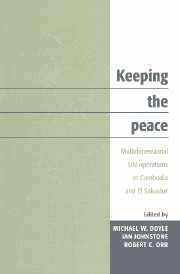Book contents
- Frontmatter
- Contents
- Preface
- Notes on the contributors
- List of abbreviations
- 1 Introduction
- Cambodia
- Map
- 2 Three visions of politics in Cambodia
- 3 The political dynamics of the peacemaking process in Cambodia
- 4 The Cambodian Settlement Agreements
- 5 Holding a fragile peace: the military and civilian components of UNTAC
- 6 Authority and elections in Cambodia
- 7 Returning home: the repatriation of Cambodian refugees
- 8 Quick impacts, slow rehabilitation in Cambodia
- El Salvador
- Conclusion and chronologies
- Select bibliography
- Index
4 - The Cambodian Settlement Agreements
Published online by Cambridge University Press: 22 October 2009
- Frontmatter
- Contents
- Preface
- Notes on the contributors
- List of abbreviations
- 1 Introduction
- Cambodia
- Map
- 2 Three visions of politics in Cambodia
- 3 The political dynamics of the peacemaking process in Cambodia
- 4 The Cambodian Settlement Agreements
- 5 Holding a fragile peace: the military and civilian components of UNTAC
- 6 Authority and elections in Cambodia
- 7 Returning home: the repatriation of Cambodian refugees
- 8 Quick impacts, slow rehabilitation in Cambodia
- El Salvador
- Conclusion and chronologies
- Select bibliography
- Index
Summary
Introduction
The Cambodian Settlement Agreements of 1991 provided a revolutionary blueprint for a comprehensive settlement to the twenty-year war in Cambodia, a conflict with both internal and international dimensions. These agreements also gave the United Nations (UN) a unique role in the settlement and management of such conflicts. Notable aspects of the Agreements include: the comprehensiveness of the settlement plan; recognition of a Supreme National Council as a vehicle for “enshrining” the sovereignty, independence, and unity of Cambodia during the transition period; and the unprecedented role of the UN in the settlement process.
The Agreements launched the UN into a new and comprehensive role that involved not only peacemaking and peacekeeping, but also “peacebuilding.” The parties agreed to an active UN role not only in facilitating a ceasefire and the disarming of the factions – the traditional terrain of UN peacekeeping – but also to a major UN role in the maintenance of law and order, the repatriation of refugees, the promotion of human rights and principles for a new constitution, the supervision and control of certain aspects of the governmental administrative machinery, and most significantly, the organization, conduct, and monitoring of elections.
The significance of the Agreements lay in the international community charging the UN – for the first time in its history – with the political and economic restructuring of a member state, through which the parties would then (it was planned) institutionalize their reconciliation.
- Type
- Chapter
- Information
- Keeping the PeaceMultidimensional UN Operations in Cambodia and El Salvador, pp. 82 - 106Publisher: Cambridge University PressPrint publication year: 1997
- 1
- Cited by



